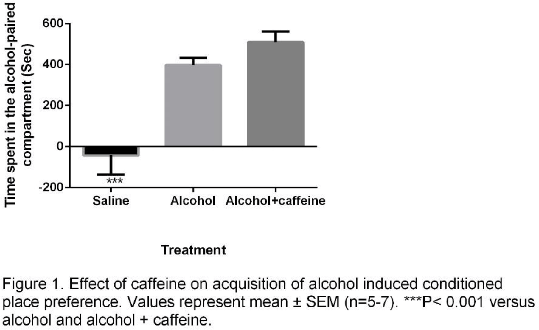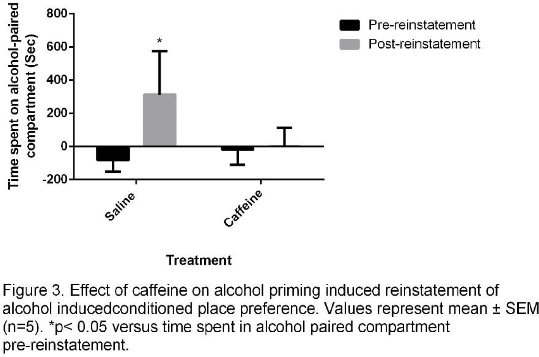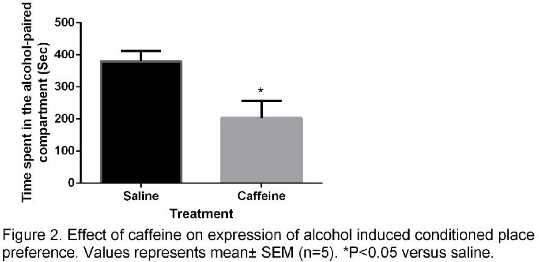Print version
Search Pub Med
| 188P London, UK Pharmacology 2017 |
Effect of caffeine on alcohol induced conditioned place preference.
Introduction: Alcohol and caffeine are two commonly co-ingested psychoactive substances. This common practice of co-ingestion of alcohol and caffeine validates the need to investigate the effect of caffeine on aspects of alcohol induced reward. While the effect of caffeine on alcohol induced reward modelled as consumption has received some attention, the effect of caffeine on alcohol induced conditioned reward has received no attention. Hence, this study was aimed at investigating the effect of caffeine on alcohol induced conditioned place preference (CPP) 1.
Method: The CPP involved placement of mice in a CPP apparatus with two highly distinct compartments .The CPP phases were, (1) habituation/preconditioning phase : the mice were allowed to freely explore the apparatus and time spent in each compartment was recorded. (2) conditioning phase (acquisition of CPP): saline or alcohol (2g/kg) or alcohol (2g/kg) and caffeine (3mg/kg) were administered through the intraperitoneal route to separate mice which were then confined to their least preferred compartments for 30 minutes on odd days. Whereas, on even days, mice received saline and were confined to their most preferred compartment for 30 minutes. (3) post conditioning phase: the mice were treated with saline or caffeine a day after the end of conditioning (for expression of CPP) or treated with saline or caffeine following a priming dose (0.4mg/kg) of alcohol after extinction of CPP (for reinstatement of CPP), before being allowed free access to explore the compartments. CPP was calculated by subtracting the time spent in alcohol paired compartment during post-conditioning from time spent in alcohol paired compartment during preconditioning. Positive values indicated preference while negative values indicated aversion2.
Results: Caffeine did not significantly increase acquisition of alcohol induced CPP (fig1). On the other hand, caffeine caused a significant (p<0.05) reduction in expression of alcohol induced CPP compared to saline (fig 2). While caffeine injection prevented the re-instatement of CPP, saline injection caused re-instatement of CPP (fig 3).
Conclusions: Given that caffeine is an adenosine receptor antagonist; our findings suggest a role for adenosine receptors in the alcohol reward and alcohol seeking behaviour.
References:
1. Liu et al. (2008). The Scientific World Journal 8:1228-1245.
2. Khan et al. (2016). Frontiers in Pharmacology 7: 1-8.




